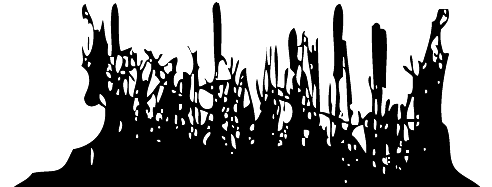Français
Finding Our Talk Season Two
- Episode 1: A Brighter Future - Mohawk
- Episode 2: Gentle Words - Maliseet
- Episode 3: The Spirit of Stories - Ojibway
- Episode 4: Language of The North - Naskapi
- Episode 5: Language of The Caribou People - Gwitchin
- Episode 6: Our Past Our Language - Secwepemc (Shushwap)
- Episode 7: Buffalo People - Dakota
- Episode 8 : Healing Power of Words - Dene
- Episode 9: Our Music is Our Language - Oneida
- Episode 10: Words from Our Scholars - Cree
- Episode 11: Words from Our Elders - Blackfoot
- Episode 12: Cultural Centres and Language
- Episode 13: The Dreamers - Dane-Zaa
Finding Our Talk Season One
Finding Our Talk Season Three
Episode 8: Healing Power of Words - Dene
This episode will look at how residential schools played a role in the destruction of Aboriginal languages in Canada. It will focus on three former residential school students who are reclaiming and using aboriginal languages as a healing component when dealing with their own personal experiences and in helping others overcome the legacy of the residential schools.
Residential schools in Canada were established to assimilate Native people while attempting to educate them by using any means necessary. These educational institutions became powerful tools of culture destruction, language suppression and personal torment.
Background
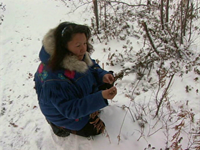 The era of the Indian Residential School lasted close to one hundred and fifty years, for those who attended, the memory lasted a lifetime. In recent years individuals have come forward with personal and painful stories of physical and sexual abuse from their experiences. The hearings of the Royal Commission on Aboriginal Peoples uncovered many such personal accounts which tell of the tragic legacy that the residential schools have left.
The era of the Indian Residential School lasted close to one hundred and fifty years, for those who attended, the memory lasted a lifetime. In recent years individuals have come forward with personal and painful stories of physical and sexual abuse from their experiences. The hearings of the Royal Commission on Aboriginal Peoples uncovered many such personal accounts which tell of the tragic legacy that the residential schools have left.
Through the personal experiences of our characters during their residential school days and life, we get an insight into our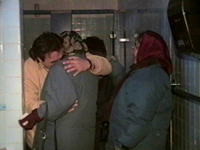 characters motivation to become healers. As we follow them in their work, we get a unique understanding of their approaches and solutions to help others overcome their own experiences.
characters motivation to become healers. As we follow them in their work, we get a unique understanding of their approaches and solutions to help others overcome their own experiences.
This story will be told from the point of view of three survivors, who are also healers in Yellowknife. Each have their own unique approach to healing and working with various healing centres and associations. They also conduct workshops and healing circles throughout the North. The majority of their clients all suffer from the residential school syndrome, which continues to have an impact on the lives of many individuals and communities.
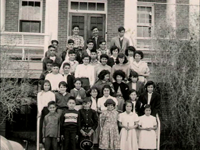 Part 1 and 2
Part 1 and 2
This episode will be told from the point of view of three survivors, who are also healers in Yellowknife. Each have their own unique approach to healing and working with various healing centres and associations. They also conduct workshops and healing circles throughout the North. The majority of their clients all suffer from the residential school syndrome, which continues to have an impact on the lives of many individuals and communities. The stories of these three residential school survivors will be intertwined throughout this episode.
Muriel Betsina was 8 years old when she was sent to residential school at Fort Resolution Mission, she stayed there for 8 years, and for those 8 years she spent it alone, scared and abused. When she entered residential school she spoke no English or French, feeling alone because she didn't speak the language of others, she became silent.
Carrying the ordeal of her experiences at the school for over 50 years, Muriel has made the mistake of passing it on to her children and grandchildren, a mistake that she is now trying to rectify by forming an association for residential school survivors. Muriel has plans to get the association going because she feels that this is the only way for people to heal. We will film her and 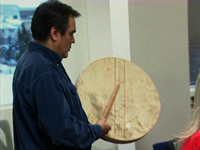 15 other people as they meet to discuss ways to heal through language, understanding and sharing. Muriel feels that the lack of knowledge of her language is a big problem for her, she insists that if she were to know more about her language she would be able to start healing. Although the pain will always be with her, her language will reinforce the loss of her culture.
15 other people as they meet to discuss ways to heal through language, understanding and sharing. Muriel feels that the lack of knowledge of her language is a big problem for her, she insists that if she were to know more about her language she would be able to start healing. Although the pain will always be with her, her language will reinforce the loss of her culture.
Bertha Blondin is also a residential school survivor of Fort Resolution, her experiences there were totally oppressive. She is considered a healer or medicine woman, she uses traditional healing, personal,community development and holistic approach to healing.
Her present path has been directed by her belief system and her visions within the spirit world. When she was 11 years old she had a dream that she should build a healing centre it wasn't until later on in life that she had the dream again, but this time stronger. This time her parents were in her dream and told her that she had to build the healing centre, in her dream her parents spoke to her in Slavey. "In the spirit world there is no English, only our language". Bertha says that language is sacred and it is important to go back to it, "We cannot waste time".
She has decided to open the healing centre and we will follow her as she attempts against all odds to follow the spirits of her dreams. We will see what she had to go through to get her project going and sit with her in meetings concerning the training of counselors, a service that will provide a mobile system. This system will have a team of counselors traveling to communities to help with the healing.
Though the residential schools are gone, the impact that it had on survivors still remain. Norman Yakelaya is Sahtu Dene of the Dhe Cho of the McKenzie River, and the director 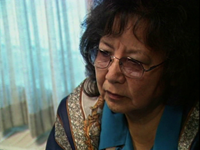 general of the Grollier Healing Circle based in Yellowknife is a survivor of Grollier Hall at Inuvik Indian residential School. It was within those walls that he was forbidden to talk his language, today he is not a fluent speaker, but can understand it quite well.
general of the Grollier Healing Circle based in Yellowknife is a survivor of Grollier Hall at Inuvik Indian residential School. It was within those walls that he was forbidden to talk his language, today he is not a fluent speaker, but can understand it quite well.
The Grollier hall Healing Circle's mandate is to train qualified personnel exclusively for Residential School survivors and their families. This healing circle represent both Inuit and First Nations language groups of NWT. The group utilizes elders in their meetings of support and guidance, as we will see. We will attend a meeting with elders and Norman along with other survivors, the elders will be speaking their language with interpreters available since a few within the group do not understand the various languages and dialects of NWT. Norman feels that the use of language within the healing circle is important. "You heal through the language".
